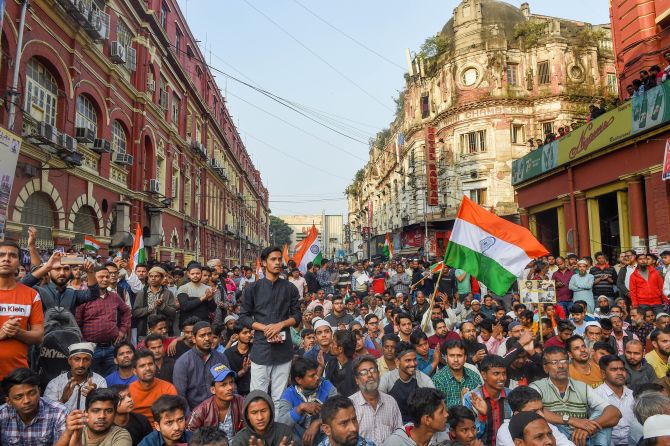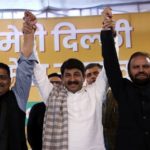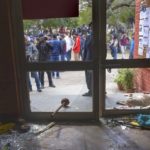Amidst strong opposition by some non-BJP ruled states, the Centre on Tuesday made it clear that the disclosure of information in the National Population Register (NPR) exercise is not mandatory but voluntary.
IMAGE: A massive rally was taken out against the NRC, CAA and NPR in Kolkata on January 21, 2020. Photograph: Ashok Bhaumik / PTI Photo.
Union Minister of State for Home G Kishan Reddy also said the NPR was first initiated by the Congress-led UPA in 2010 and it was a constitutional obligation.
“Disclosure of information in NPR is voluntary only,” he told reporters in New Delhi.
Reddy said since NPR is a constitutional obligation, state governments should not oppose it.
The minister also said the central government will keep sensitising states about various aspects of the NPR exercise that will be carried out along with the house listing phase of the Census 2021 from April 1 to September 30, 2020.
A few state governments have declared that they will not participate in the NPR exercise, saying it is prelude to a countrywide National Register of Citizens (NRC).
West Bengal Chief Minister Mamata Banerjee has appealed to her counterparts in the northeast and non-BJP states to carefully study the NPR form, its questions and criteria before taking a decision on updating it.
Dubbing the exercise as “a dangerous game”, Banerjee said the form, which seeks birth details and residential proof of parents, was nothing but a precursor to NRC.
The Kerala government has announced that it will implement the census exercise but will not cooperate with the NPR.
At a recent special cabinet meeting of the Kerala government chaired by Chief Minister Pinarayi Vijayan, it was decided to communicate to the Registrar General of India (RGI) and Census Commissioner about the state’s opposition to the NPR.
“As the NPR is a process that leads to the NRC, there is a sense of fear among the people. If the NPR and NRC are implemented in Kerala, it will lead to widespread anarchy. That is the experience of the state where the NRC was implemented,” said a statement released by the Kerala Chief Minister’s Office.
At a meeting of about 20 opposition parties led by Congress president Sonia Gandhi about a fortnight ago, it was decided that the parties will urge all chief ministers who have decided not to implement the NRC in their states to also consider suspending the NPR enumeration “as this will be a prelude to the NRC”.
The NPR is a register of usual residents of the country. It is being prepared at the local village/sub-town, subdistrict, district, state and national levels under the provisions of the Citizenship Act, 1955, and the Citizenship (Registration of Citizens and Issue of National Identity Cards) Rules, 2003.
For the purposes of the NPR, a usual resident is defined as a person who has resided in a local area for past six months or more or a person who intends to reside in that area for the next six months.
The data for NPR was last collected in 2010 along with the house listing phase of the Census 2011. The data was updated in 2015 by conducting door to door survey. The government had then asked details like Aadhaar and mobile number of residents.
This time, the information related to their driving licence and voter ID card may also be gathered. PAN card details will not be collected as part of this exercise.
The law compulsorily seeks to register every citizen of India and issue a national identity card.
Assam has been excluded from NPR because the NRC exercise has already been conducted in the state.
The demographic details are required for every usual resident: name, relationship to head of household, father’s name, mother’s name, marital status, spouse’s name (if married), sex, date and place of birth, nationality (as declared), present address of usual residence, duration of stay at present address, permanent residential address, occupation, educational qualification.
The Union Cabinet has approved Rs 3,941.35 crore for the NPR exercise.




